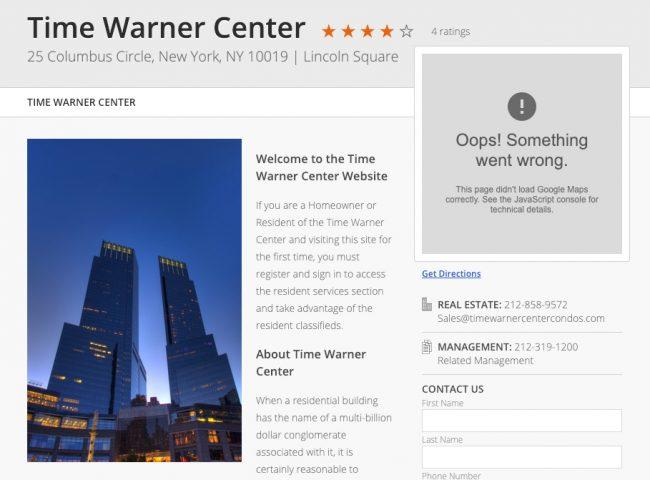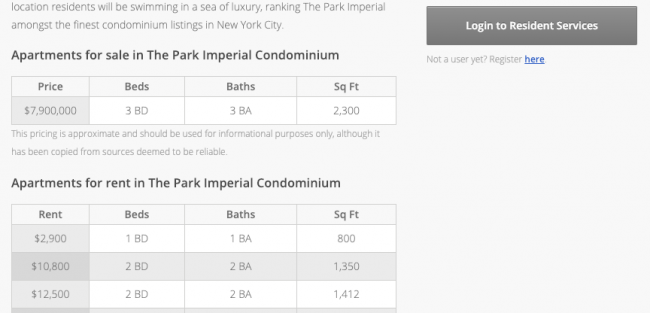Give these websites just a glance, and you might reasonably think they are for some of Manhattan’s toniest condominium buildings. But visit any of the sites, and you’ll quickly notice something’s off.
timewarnercentercondos.com
trumpworldtowernyc.com
theparkimperialnyc.com
“When a residential building has the name of a multi-billion dollar conglomerate associated with it, it is certainly reasonable to imagine that is [sic] apartments will be masterpieces of luxury living,” proclaims timewarnercentercondos.com. To the right of the page is a box where interested buyers can submit their information.
These websites might be trying to masquerade as the real thing, but they’re certainly not going all out. The production values “are significantly worse than most of the ones that I’ve seen,” said Jared Seeger, president of Knightsbridge Park, a digital real-estate marketing agency that often has to deal with copycat websites. “You’d have to be pretty new to this business to mistake one of these for a building’s official website.”
And yet, these sites are thriving, actively selling leads to real estate brokers. An investigation by The Real Deal found more than 270 such websites for luxury apartment buildings all over New York City, all with the same layout and seemingly operated by the same, anonymous owner.
This network of sites is one of the most prominent examples of the sketchy tactics often employed in the vast badlands of online lead-generation, where brokers dealing with a slowing market and a reluctant buyer pool will often wade into gray areas to find business. And given the lack of regulation in the space, this behavior runs rampant, not only in New York but in other major condo markets like Miami.
After submitting a number of inquiries through sites in this network, TRD was contacted by two different brokers at Elegran Real Estate, which Inman News named the nation’s “Most Innovative” brokerage in 2017, in large part thanks to its proprietary lead management platform and “diverse lead generation network.”
“Elegran has in place a process for continually vetting the transparency and compliance of our lead generation sources,” Michael Rossi, the firm’s CEO, said in a statement. “However, this is not easy since it’s inherently difficult to piece together from where a lead is ultimately generated.”
Eminent domains
The market for agent advertising is pegged at being in the $15 billion range, and the share of that spend happening online is growing constantly. In real estate, the online lead-generation space was turned into a viable industry by Zillow and Trulia, and now includes other major players such as Rupert Murdoch’s Realtor.com. The old guard of New York-based residential brokerages, after a brief tantrum, have started experimenting with the practice of buying leads. But some newer firms, such as Elegran, TripleMint and LG Fairmont, have made it a central component of their business model.
“The lead-generation landscape is changing constantly,” Rossi said. “Most networks seem to pull from multiple sources and are primarily driven by quantitative technology not subjective judgement.”
The quality and provenance of such leads, however, remains in question. Zillow, as the biggest player in the space in New York through its StreetEasy subsidiary, has generated plenty of revenue from ramping up its practice, but a fair deal of controversy too. And the 270-site cluster (referred to as “The Network” for the remainder of this article) illustrates that not everything in this world operates above board.
What sets the Network apart is its sheer scale.
“The more frequent situation is that you have one or two of these pop up at a time,” Seeger said. In his experience, a network of 200-plus sites is a major outlier.
Laid out on a map, the buildings covered by the Network span most of Manhattan, from Harlem to the Financial District, with a few outposts in Brooklyn and Queens. By using domain-registration records from the Internet Corporation for Assigned Names and Numbers (ICANN), as well as the Internet Archive’s “Wayback Machine,” TRD was able to establish a timeline of its evolution. The first site in the Network, chelseastratusny.com was created in July 2012, and the lion’s share of the sites were registered over the next year. The newest site, harlemsol.com, popped up in December 2018.
Prior to being registered by the Network, more than a third of the domain names were being used for other purposes – often as bonafide websites for the buildings in question.
For example, www.thecharlestonnyc.com once served as the official site of the Charleston, a Murray Hill condo project developed by LCOR & CalSTRS. But after the building sold out, the website ceased to be maintained, leaving the door open to a takeover by the Network in 2016.
TRD monitored the Network for several weeks, and the template used across the websites was updated three times during this period. First, listing information was removed from all sites, and a phone number labelled “Real Estate” was removed from most of them. A week later, a paragraph of introductory text was removed from all sites as well. And finally, a disclaimer was added stating that the site has no connection to the building, developer or management company. These changes, applied in a short time across all websites, strongly indicate that they are still being managed by a single owner. Domain-registry records do not reveal who that owner is, however.
Baby food from a blender

(timewarnercentercondos.com, archived on August 14, 2016)
The first Elegran agent to reach out to TRD was following up on a lead from www.theriverridgecondo.com, and left a voicemail stating his name and company just a few hours after this reporter submitted his contact information. A few weeks later, a second Elegran broker followed up on a lead from 123thirdavenue.com and spoke with the reporter briefly, acknowledging that the lead was provided to him by a third party. (The 46-unit River Ridge at 78 Ridge Street was converted to a condominium by East Soho Corp in 2007, and the 47-unit 123 Third Avenue was built by Orange Management and F&T Group in 2010.)
Both agents were new hires at Elegran, who had just received their broker licenses last fall.
“Elegran is committed to full transparency to the end consumer at every stage of the sales process,” Rossi said. “Our firm’s policy is to disassociate with any lead provider that is not sufficiently transparent or compliant with both our own standards and those of our industry. We remain 100% committed to acquiring our leads solely via vendors and methods that are fully compliant with both the DOS and REBNY.”
In a 2017 interview, Rossi said that new agents at Elegran relied most on online leads, which account for 35 to 40 percent of the firm’s transactions.
“It’s like giving a baby food from a blender before it can eat solid food,” he said.
“I closed 13 deals in my first 3 months at Elegran and I think that success can be attributed to the leads Elegran provides,” an endorsement from an agent on the firm’s site reads. “I’ve heard that agents at other companies spend up to 60 percent of their time looking for leads, and that’s a huge amount of time that should be dedicated to your client.”
Of course, copycat websites are (or were) just one component of Elegran’s massive network of lead sources. Elegran was also the top buyer of StreetEasy Premier Agent leads in three of the city’s five most expensive zip codes, according to a TRD analysis in 2017.
In an effort to see what other firms are customers of the Network, TRD reached out to dozens of phone numbers listed on these sites, but did not hear back from any other agents. The majority of phone numbers led to unresponsive voicemail boxes, though two phone numbers – for 124w24.com and www.40west55th.com – appear to be associated with agents who once worked at Halstead Property. Both numbers were inactive.
“As a firm, we’re not paying for agents to sponsor these sites. If an agent is doing it as an independent contractor of their own volition, that has nothing to do with us as a firm,” Halstead president Richard Grossman said, adding that the firm does pay customary referral fees for legally-acquired leads, and does also participate in lead-generation programs such as StreetEasy’s Premier Broker.
“It’s a scam”

(theparkimperialnyc.com, archived on March 23, 2015)
As shown in disputes over StreetEasy’s Premier Agent last year, the New York Department of State takes the position that lead generation is a form of advertising, with all the legal implications that entails.
“A real estate broker that chooses to purchase leads or advertise on a lead-generation website that either causes consumer confusion, lacks transparency, is misleading, is inaccurate and/or is dishonest could be held responsible for the manner in which such website is conducting its business,” Neil Garfinkel, an attorney who serves as Broker Counsel for REBNY, wrote in a newsletter for the trade group’s members in March.
“This analysis takes into account that the Website does not have a real estate license and is not regulated by the DOS,” he added. “The DOS and REBNY could pursue the real estate broker that chooses to advertise on such Website, as that is the party that the DOS and REBNY have jurisdiction over.”
The Network does appear to be aware of potential legal pitfalls. Extensive disclaimers on a separate page state that each site “is strictly for information purposes only and in no way does it hold itself out to the public as a licensed real estate broker or a representative of the buildings, apartments and/or information provided in relation to the content and affiliates” of that site. Additional disclaimers were later added to the main page.
But it’s unclear what legal buffer such a disclaimer provides. Up until early this year, all sites in the Network included a “Resident Services” form, implying that the site had some real relationship to residents of the building. Furthermore, many sites in the Network include contact information for the building’s management – apparently without the building’s knowledge.
“It’s a scam,” said Paul Brensilber, president of Jordan Cooper & Associates, which manages four buildings covered by the Network. Brensilber said he had not seen any of these sites previously. “They’re putting this number up there without management’s consent, and making it seem like they have a relationship with the building. I think the DOS would be very interested to hear about this.”
(One site for a building managed by the firm, 123thirdavenue.com, produced a lead that was then sold to an Elegran broker.)
Knightsbridge Park’s Seeger says that when his clients want a copycat site taken down, the first step is usually to send a cease-and-desist letter to the site’s owner. However, it’s “frequently not easy to figure out” who to send it to, he added, because the sites are often registered to anonymous LLCs.
And the irony is that often his clients don’t see these sites as a negative. In a market where developers have resorted to advancing broker commissions to motivate brokers, anything that brings people into the door and drums up business could be welcomed.
In the end, the longevity of this six-year-old lead generation network speaks for itself. There’s enough in it for the owner of these sites to keep them up and running. And no one seems bothered enough to seriously try and take them down.
“I guess even if you’re getting just one or two people a year, and getting a commission off that multimillion-dollar deal, that alone is justification to keep this up and running,” Seeger said. “It’s not super expensive to maintain something like this.”
